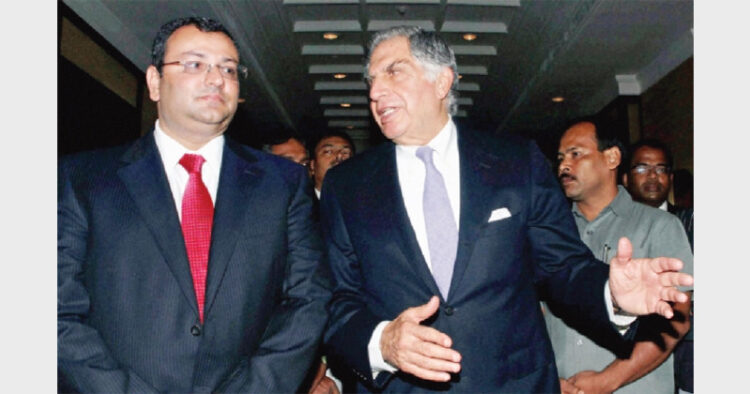Tata is trying to re-establish the brand value by
putting ethics & values over quarterly results
Sandeep Singh
The happenings at the house of TATA’s continue to grab headlines amidst demonetisation, underlining its importance. Removal of chairman in itself is neither new nor shocking. But what indeed is shocking is the fact that the past chairman Cyrus Mistry’s family has 18.5 per cent share in Tata Sons and has close family relationship with the Tatas; still he was removed.
It is difficult to believe that someone who has such high stakes will not be sincere in his work. But sincerity alone can’t help one manage an organisation successfully.
The Tata group comprises over a 100 operating companies spread across six continents. And almost all the companies have got a board and a chairman to manage them. Each brand under the Tata brand umbrella—Tata Steel, Tata Motors, Tata Tea, Tata Telecom etc—has its own distinct identity but none of these sub-brands are disconnected with brand Tata. What sub-brand says or does is reflected on the mother brand too. Perhaps this is where Mistry faltered.
In an article titled “Is Brand Tata Losing its Way?” (http://indiafacts.org/11648-2/) dated November 20, 2015, I had sighted how Brand Tata was losing its focus. Following is an example: “An organisation which had come out with the iconic positioning line “Tata Namak Desh Ka Namak,” had ended up associating itself with AIB, (All India Bakchod) a program bordering X rated movies. I had raised the question “Is this the consequence of shifting of brand Tata from the hands of a ‘Tata’ to ‘Mistry?’ Or is this the effect of the new Brand Custodian Dr Mukund Rajan?” And had concluded “Hope corrective measures are taken before brand Tata loses its way.”
The appeal from Tata group to all the stakeholders of Tata Companies goes on to say something similar. In point 7 it says “In our opinion, his actions are driven by a perverse motivation to cause harm to the ‘Tata’ brand and to intentionally erode shareholder value.”
And in point 8 it says, “Finally and most importantly — it must be recalled that the operating Tata companies and Tata Sons have, for many decades, worked cohesively and seamlessly for the benefit of all the stakeholders,
namely, the companies, their shareholders and employees and for society at large. There has been no other agenda or personal interest as ultimately even the dividends paid to Tata Sons and subsequently to its own
shareholders went back to philanthropy except for those paid to the minority shareholders. The operating Tata
companies have individually grown and prospered but they have also benefitted in no small measure from being part of the Tata Group. This encompasses the ability to attract and retain management and employees, use the TATA brand nationally and internationally, which has been painstakingly built up over the past decades, help in the marketing of their products and their ability to attract capital in all forms and give the comfort of safety because of the past default-free record. Therefore, Tata companies do not exist in a vacuum but benefit from being part of the Tata Group which is most evident in times of difficulty. All such benefits are likely to be at stake if Mr Mistry continues to remain Chairman, as his continuance is likely to lead to fragmentation of the Tata Group. For this purpose alone, Tata Sons would need the support of all, big and small, shareholders who have stood with the Tata Group at all times.”
The ‘values’ and ‘ethics’ are most difficult to perceive because they are intangible and more so in the corporate world, where monetary considerations are the foremost. Majority of directors and shareholders in today’s time will be bothered about short term monetary gains at the cost of value, which gives longevity and strength to organisation. (In fact few directors, shareholders and financial institutions have indeed
sighted the financial results to support the ex-chairman). The steps taken by the Tata Sons, to preserve the values can only be appreciated by those who find merit in “values and ethics” and have gone through the 150 long years of history of Tata Group.
The group has stood against the British, has seen nationalisation of its big and profitable ventures, has fought individual satraps, and has faced terror attacks but has never given up its values and ethics.
As far as the effect of on-going public spat on the brand Tata goes, I will site a paragraph from case study on Tata Group in my book “Indian Ocean Strategy” (2010); “Mr Gopalakrishnan appends another element to the winning Tata brand mix — candidness. ‘All brands are susceptible to the occasional aberration’, he says.‘Consumer swill not like this but they will forgive you, provided the aberration is recognised and you get back to what you stand for…. The Tata brand has shown that, like human beings, it is fallible. It makes mistakes once in a while, but It is can did enough to acknowledge its error, correct it and move on’.” I am sure the step taken by Tata Group will bring back the focus on ‘Value’ and ‘Ethics’; in the current corporate world where ‘Quarterly Results’ have overpowered everything else.
(The writer is founder of www.swastik.net.in)














Comments